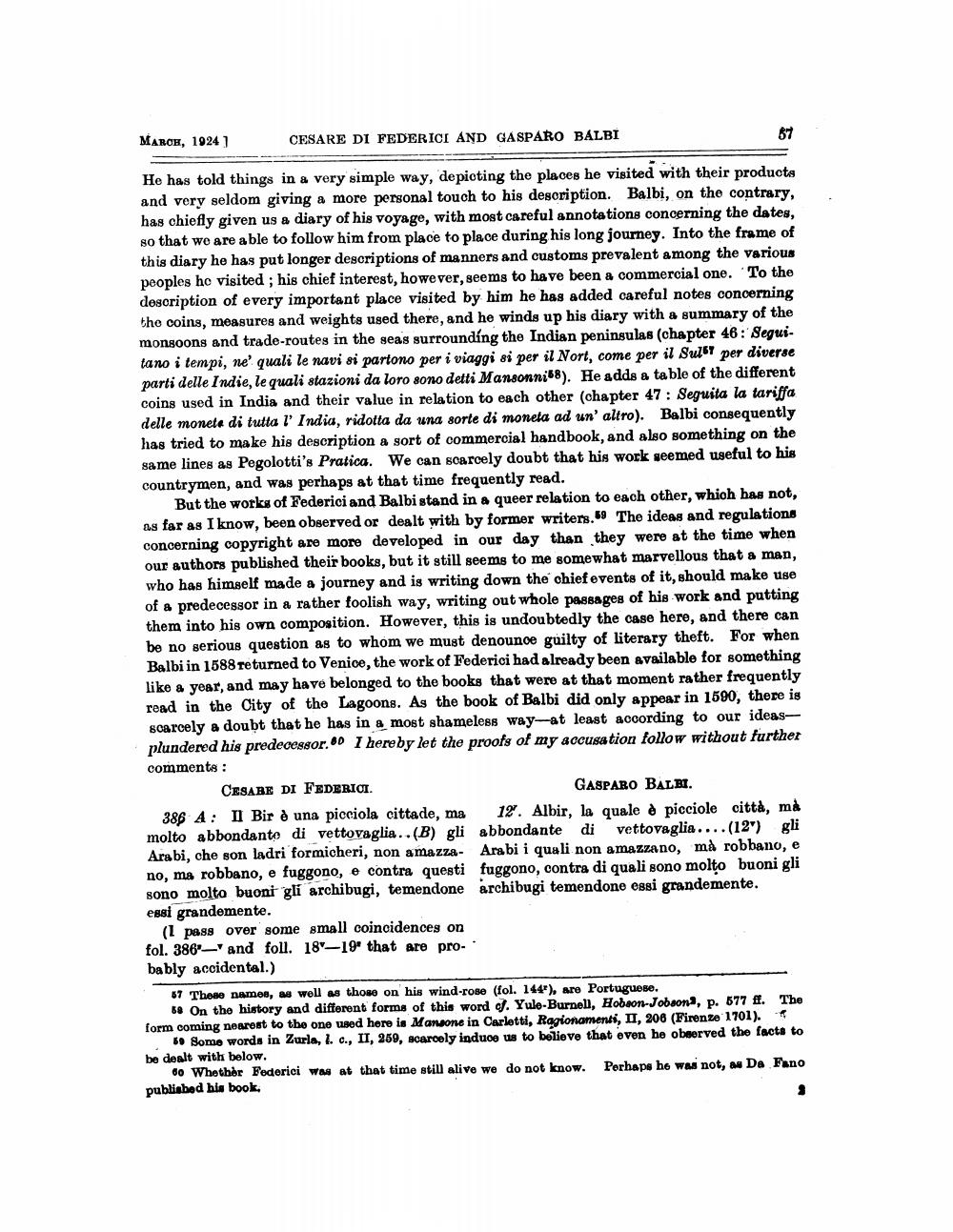________________
MAROH, 1924)
CESARE DI FEDERICI AND GASPARO BALBI
He has told things in a very simple way, depicting the places he visited with their products and very seldom giving a more personal touch to his desoription. Balbi, on the contrary, has chiefly given us a diary of his voyage, with most careful annotations concerning the dates, so that we are able to follow him from place to place during his long journey. Into the frame of this diary he has put longer descriptions of manners and customs prevalent among the various peoples ho visited ; his chief interest, however, seems to have been a commercial one. To the description of every important place visited by him he has added careful notes concerning the coins, measures and weights used there, and he winds up his diary with a summary of the monsoons and trade-routes in the seas surrounding the Indian peninsulas (chapter 46: Seguitano i tempi, ne' quali le navi si partono per i viaggi si per il Nort, come per il Sult per diverse parti delle Indie, le quali stazioni da loro sono detti Mansonni68). He adds a table of the different coins used in India and their value in relation to each other chapter 47: Seguita la tariffa delle moneta di tutta l' India, ridotta da una sorte di moneta ad un' altro). Balbi consequently has tried to make his description a sort of commercial handbook, and also something on the same lines as Pegolotti's Pratica. We can scarcely doubt that his work seemed useful to his countrymen, and was perhaps at that time frequently read.
But the works of Federici and Balbi stand in a queer relation to each other, which has not, as far as I know, been observed or dealt with by former writers. The ideas and regulations concerning copyright are more developed in our day than they were at the time when our authors published their books, but it still seems to me somewhat marvellous that a man, who has himself made a journey and is writing down the chief events of it, should make use of a predecessor in a rather foolish way, writing out whole passages of his work and putting them into his own composition. However, this is undoubtedly the case here, and there can be no serious question as to whom we must denounce guilty of literary theft. For when Balbi in 1588 returned to Venice, the work of Federici had already been available for something like a year, and may have belonged to the books that were at that moment rather frequently read in the City of the Lagoons. As the book of Balbi did only appear in 1590, there is scarcely a doubt that he has in a most shameless way-at least according to our ideasplundered his predecessor.80 I hereby let the proofs of my accusation follow without further comments: CESARE DI FEDERICI.
GASPARO BALBI. 386 A: II Bir è una picciola cittade, ma 12. Albir, la quale è picciole città, ma molto abbondanto di vettovaglia..(B) gli abbondante di vettovaglia....(12) gli Arabi, che son ladri formicheri, non amazza- Arabi i quali non amazzano, má robbano, e no, ma robbano, e fuggono, e contra questi fuggono, contra di quali sono molto buoni gli sono molto buoni gli archibugi, temendone archibugi temendone essi grandemente. essi grandemente.
(1 pass over some small coincidences on fol. 386_ and foll. 18-19 that are probably accidental.)
57 Those names, as well as those on his wind-rose (fol. 144'), are Portuguese.
68 On the history and different forms of this word d. Yule-Burnell, Hobson-Jobsona, p. 577 ff. The form coming nearest to the one used here is Mansone in Carletti, Ragionamenti, II, 206 (Firenze 1701).
59 Some words in Zurla, l. c., II, 259, scarcely induce us to believe that even be observed the facts to be dealt with below.
do Whether Federici w at that time still alive we do not know. Perhaps he was not, aw Da Fano publiabod his book.




